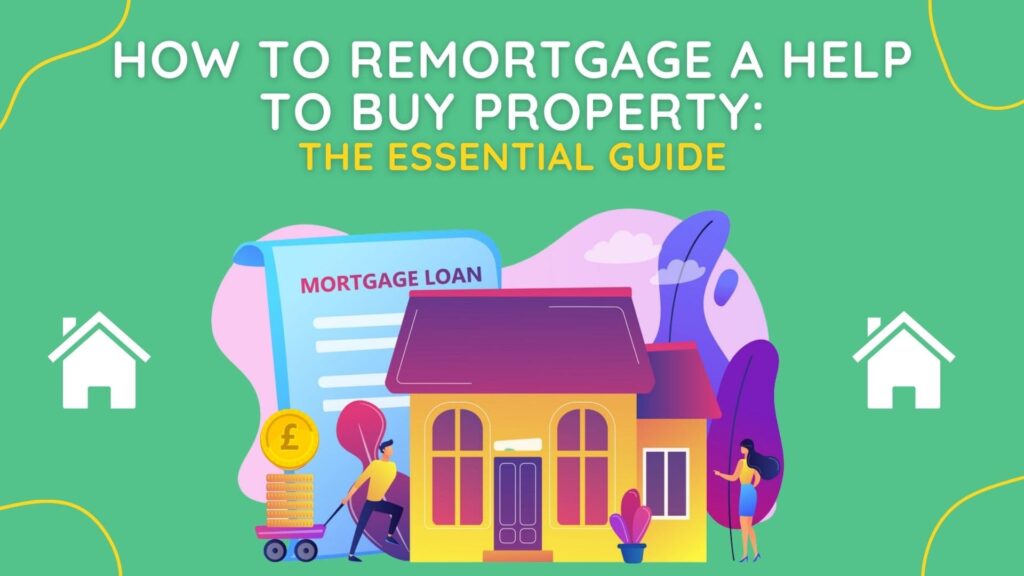
Sammie Ellard-King
I’m Sammie, a money expert and business owner passionate about helping you take control of your wallet. My mission with Up the Gains is to create a safe space to help improve your finances, cut your costs and make you feel good while doing it.

Quickfire Roundup:
When it comes to remortgaging a help to buy property, this is possible but it can be tricky. That’s because you have the outstanding balance to consider as well as the equity loan.
Looking for a new lender isn’t always easy as there are fewer of these who are willing to remortgage a help to buy. A mortgage broker is a must to guide you through the process, and to find the best deal.
The Help to Buy equity loan scheme was launched back in 2021. Applications for these equity loans were closed in March 2023, and those who got in before the deadline have until 31st May 2023 to complete their house purchase.
As we’ll see those who meet the deadline will soon be faced with considering how to remortgage a help to buy property.
To be eligible for this government scheme, applicants had to be at least 18 years of age and be first time buyers.
The help to buy equity loan worked by allowing buyers to take a government loan of 20% of the value of a new build house (up to 40% of the property value in London) and then secure a mortgage with just a 5% deposit.
The government loan is set to be interest-free for 5 years and, without a remortgage, those monthly repayments can start to get a little steep.
As you read on, I’m going to share what your options are with a help to buy equity loan, and why you need to act.
Boon Brokers are one of the UKs leading online mortgage brokers. They have a 5-star excellent Trustpilot rating with over 543 reviews.
- No mortgage fees
- Whole of market access
- Free online consultations
- Directly authorised by the FCA
- No in person meet ups
Table of Contents
How to remortgage a help to buy property?
Taking out a Help to Buy equity loan is a great move that can help you get onto the property ladder with a much lower deposit.
However, after 5 years the government loan is subject to interest and this is when you need to reassess your position.

At the 5-year mark, you could choose to carry on as you are. However, with the interest on your loan, you’ll face higher monthly repayments.
That’s why it’s best to explore a remortgage so that you can keep your mortgage payments down. You could do this with your existing lender or take a look at what a new lender could offer.
When it comes to getting the best deal and competitive interest rates, you could use a remortgage calculator to help. You should also consult with a mortgage broker who has access to the whole of the market.
If you’re coming to the end of a fixed rate mortgage then it could be a great time to remortgage.
Can you remortgage with help to buy?
When looking at a remortgage, the lender will consider the loan to value. This is how much you want to borrow compared to how much the house is worth.
That means that they will consider how much equity you have in the property. If house prices have increased, this is good news for you.
You’ll also be in a better position if you have a good credit history. This means that you need to make sure that you maintain your mortgage repayments every month, as well as manage any other credit commitments that you have.
Paying Back Help To Buy
For those looking to remortgage with help to buy still need to think about paying the loan back.
This loan, which initially helped you purchase your home, typically covers up to 20% of the property value (40% in London), and becomes repayable after five years without interest charges.
To start the repayment process, you’ll need a property valuation from an accredited surveyor, as the amount you repay is based on the current market value of your home, not the amount you originally borrowed.
When remortgaging, you have two primary options: either remortgage for a larger amount to cover the equity loan repayment or save separately to pay off this loan.
It’s essential to consider your financial situation and the current property market to decide the best course of action.
Remortgaging to repay the Help to Buy loan can potentially reduce your overall monthly costs, as mortgage rates are usually lower than the loan’s interest rates after the initial interest-free period.
Remember, paying back the Help to Buy loan also means you regain full ownership of your property, making this a significant step towards complete homeownership.
However, navigating this process can be complex, and seeking advice from a mortgage advisor is highly recommended to ensure you make the most financially sound decision.
What if I don't remortgage with a help to buy equity loan?
If you take no action with your Help to Buy loan, everything starts to get more expensive and costs you more money.
With your current mortgage lender, you’ll find deals coming to an end. You get placed on the standard variable rate, and this attracts higher interest rates.
Added to this, you then start to make a loan repayment each month. The first 5 years see you making a £1 per month management fee payment. In year 6, you start paying interest.
The interest rate starts at 1.75%. After this, it increases every year in line with the Retail price index measure of inflation, with an additional 1% on top.
Securing a new mortgage deal, and exploring the options to repay your equity loan, are a must if you want to prevent these increases.
Independent financial advice is a must so that you fully understand the options that are open to you.

Is it easy to remortgage a property that has a help to buy loan?
It’s certainly possible, but it’s not always easy to find a new mortgage to clear the one with your existing lender and the equity loan.
Mortgage lenders will see you as a higher risk because you’ll need to manage your monthly payments to them as well as make equity loan payments each month.
This extra risk means that you may need a specialist lender or need to seek out a specialist broker who fully understands Help to Buy Equity Loans.
The remortgage timeline will differ from a standard property, but if everything goes smoothly you’re looking at 6-10 weeks.
Generally, a remortgage will be much easier if you’ve already cleared your Help to Buy equity loan, but if you haven’t yet managed to do this, you still have a few options open to you:
Maintain the full loan
There may be options with your current lender, or even a new one, although you’ll find that these are limited and, generally, attract high fees.
If you go down this route, you still have the equity loan to contend with and, as it’s based on the value of your house, if your property value is going up, you could find yourself owing more.
Staircase the loan
This refers to partially repaying the equity loan. Monthly payments are made so that you can try and reduce it to 10% of the property value.
This has the benefit of reducing what you owe, but also allowing you to build the equity in the property.
The monthly repayments are decided on between the lender and the help to buy scheme administrator. They use an independent property valuation to agree on the repayment options that exist.
Use a remortgage to repay the equity loan
The 3rd possibility is to add your current mortgage and the government loan together and then seek a remortgage that pays it all off.
This means that you never then need to worry about repaying the 20% loan to value down the line. It allows you to fully benefit from any future growth.
For this to work, your property price needs to have gone up, and you can’t be in negative equity (essentially you need to release equity to repay the loan).
How to clear the equity loan
If you want to clear the equity loan early (you have up to 25 years) so that you have access to a more competitive mortgage deal, these are the steps to follow:
- Get a chartered surveyors valuation report – this will give you the property value and you’ll then know how much you owe to the government scheme (20% to 40% of the value)
- Enlist a solicitor to carry out the legal aspects of paying the loan (legal fees will vary between solicitors)
- File a loan redemption form. You can get your hands on one of these via the housing association that is involved with your Help to Buy. Once filed, you’ll need to pay an admin fee of between £200 and £250
- You’ll then receive a redemption letter in the post. This will provide you with an estimated repayment figure
- Once you give your solicitor the go-ahead, they will arrange a completion date for when the loan is to be repaid. Target, who is in charge of collecting Help to Buy loans will then send an authority to complete
- You then make payment and your Help to Buy equity loan is clear
Boon Brokers are one of the UKs leading online mortgage brokers. They have a 5-star excellent Trustpilot rating with over 543 reviews.
- No mortgage fees
- Whole of market access
- Free online consultations
- Directly authorised by the FCA
- No in person meet ups
What if the market value puts my help to buy property in negative equity?
Negative equity puts pay to any idea of seeking a new deal.
If the value of your property is at a level where it won’t cover what you owe, your only real option is to stick things out and move to your current lender’s standard variable rate, while hoping that property prices soon increase.
FAQs
Is it hard to remortgage with Help to Buy?
Remortgaging with a Help to Buy Equity Loan can be more complex than a standard remortgage due to the nature of the scheme.
The government owns a percentage of your property through the equity loan, and this must be taken into account when remortgaging.
Depending on your circumstances, you may choose to remortgage to repay the Help to Buy loan, or you could continue with it and just change the mortgage.
In either case, not all lenders offer Help to Buy remortgages, so your options may be more limited.
If you’re considering this, it could be beneficial to seek advice from a mortgage broker who has experience with Help to Buy remortgages.
How do you release equity with Help to Buy?
If you have a Help to Buy Equity Loan and want to release equity from your property, you’ll need to consider the government’s loan as well.
The government owns a percentage of your home through the Help to Buy Equity Loan, typically up to 20% (or up to 40% in London).
One way to release equity is by remortgaging your property. If your home has increased in value, you might be able to get a larger mortgage and use the extra funds to repay the Help to Buy loan, leaving you with only the mortgage to pay off.
However, keep in mind that the amount you owe on the Help to Buy loan will increase if your property’s value has gone up, as it is a percentage of the current value, not the original loan amount.
You’ll also need to get the property valued as part of the process of paying off the Help to Buy loan.
What happens after 5 years with Help to Buy mortgage?
After the first five years of a Help to Buy Equity Loan, you begin to pay loan fees on the government equity loan portion of your mortgage. For the first five years, the equity loan is interest-free.
In the sixth year, you’re charged a fee of 1.75% of the loan’s value. After this, the fee increases every year.
The increase is worked out by using the Retail Prices Index plus 1%. These fees are just the charge for borrowing the money and don’t count towards paying back the equity loan.
If you sell your home, you’ll need to repay the equity loan at the same time. The amount to be repaid is the equivalent percentage of your home’s current value.
You can choose to repay the equity loan in full at any time, without any penalties, or upon remortgaging, typically when the initial mortgage deal ends. Remember, any repayment must be at least 10% of the property’s current market value.
It’s also important to consider that not all lenders will offer a remortgage on properties with an outstanding Help to Buy equity loan.
Consulting with a mortgage advisor can provide guidance on the best course of action for your circumstances.
Do Help to Buy properties lose value?
Help to Buy properties do not inherently lose value simply because they were purchased using the scheme. The value of a property can be influenced by numerous factors such as the overall state of the housing market, the local area, the condition of the property, and broader economic conditions.
However, it’s important to remember that when you sell a property purchased with a Help to Buy Equity Loan, you have to repay the same percentage of the sale price as the initial equity loan.
So, if your property has increased in value, the amount you owe will also have increased. Conversely, if your property’s value decreases, the amount you owe on the equity loan will decrease proportionately.
Final thoughts on how to remortgage a Help to Buy property
It’s important to move from your existing mortgage deal as soon as possible so that you avoid going onto your current lender’s standard variable rate.
This will attract higher interest rates and that means higher monthly payments. You’ll also have your Help to Buy loan payments to contend with.
Finding a remortgage deal is easier if you have gone some way to clear your equity loan. If you haven’t been able to do this, you still have options but these are limited.
As ever. mortgage brokers are your friend and they can advise the best course of action based on your personal circumstances.
MORE LIKE THIS
Share on social media
Disclaimer: Content on this page is for informational purposes and does not constitute financial advice. Always do your own research before making a financially related decision.



